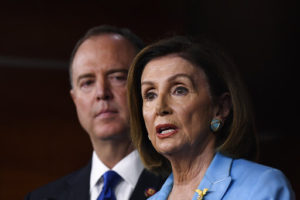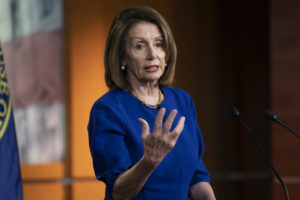U.S. Begins Possible Full Withdrawal From Northern Syria
The pullout comes despite growing chaos, cries of betrayal and signs that Turkey's invasion could fuel a broader war. Turkey launches a military operation against Kurdish fighters in northeastern Syria on Wednesday after U.S. forces pulled back from the area. (Lefteris Pitarakis / AP)
Turkey launches a military operation against Kurdish fighters in northeastern Syria on Wednesday after U.S. forces pulled back from the area. (Lefteris Pitarakis / AP)
WASHINGTON—The United States appears to be heading toward a full military withdrawal from Syria amid growing chaos, cries of betrayal and signs that Turkey’s invasion could fuel a broader war.
Defense Secretary Mark Esper said Sunday that President Donald Trump had directed U.S. troops in northern Syria to begin pulling out “as safely and quickly as possible.” He did not say Trump ordered troops to leave Syria, but that seemed like the next step in a combat zone growing more unstable by the hour.
Esper, interviewed on two TV news shows, said the administration was considering its options.
“We have American forces likely caught between two opposing advancing armies and it’s a very untenable situation,” Esper said.
This seemed likely to herald the end of a five-year effort to partner with Syrian Kurdish and Arab fighters to ensure a lasting defeat of the Islamic State group. Hundreds of IS supporters escaped a holding camp amid clashes between invading Turkish-led forces and Kurdish fighters, and analysts said an IS resurgence seemed more likely, just months after Trump declared the extremists defeated.
The U.S. has had about 1,000 troops in northeastern Syria allied with the Kurdish-led Syrian Democratic Forces to combat IS. The Pentagon previously had pulled about 30 of these troops from the Turkish attack zone along the border. With an escalation of violence, a widening of the Turkish incursion and the prospect of a deepening conflict, all U.S. forces along the border will now follow that move. It was unclear where they would go.
The Pentagon chief did not say U.S. troops are leaving Syria entirely. The only other U.S. presence in Syria is at Tanf garrison, near Syria’s eastern border with Jordan. The U.S. and coalition troops there are not involved in the Kurd mission, and so it seems highly unlikely the 1,000 being moved from the north would go to Tanf.
Critics say the U.S. has betrayed the Kurds by pulling back in the face of Turkey’s invasion, but Esper said the administration was left with little choice once President Recep Tayyip Erdogan told Trump a week ago that he was going ahead with a military offensive. Esper said the Kurds have been good partners, “but at the same time, we didn’t sign up to fight the Turks on their behalf.”
The Kurds then turned to the Syrian government and Russia for military assistance, further complicating the battlefield.
The fast-moving developments were a further unraveling of U.S. counterterrorism efforts in Syria, and they highlighted an extraordinary breakdown in relations between the United States and Turkey, NATO allies for decades. Turkish troops have often fought alongside American troops, including in the Korean War and in Afghanistan.
Asked whether he thought Turkey would deliberately attack American troops in Syria, Esper said, “I don’t know whether they would or wouldn’t.”
He cited an incident on Friday in which a small number of U.S. troops fell under artillery fire at an observation post in the north. Esper called that an example of “indiscriminate fire” coming close to Americans, adding it was unclear whether that was an accident.
Esper disputed the notion that the U.S. could have stopped Turkey from invading in the first place. He said Erdogan had made clear he was going to launch his incursion “regardless of what we did.”
Strongly critical of the Turks, Esper said “the arc of their behavior over the past several years has been terrible.” He added: “I mean, they are spinning out of the Western orbit, if you will. We see them purchasing Russian arms, cuddling up to President Putin. We see them doing all these things that, frankly, concern us.”
The chairman of the House Foreign Affairs Committee, Rep. Eliot Engel, D-N.Y., said the U.S. and its NATO partners should consider expelling Turkey from the alliance. “How do you have a NATO ally who’s in cahoots with the Russians, when the Russians are the adversaries of NATO?”
In explaining Trump’s decision to withdraw from northern Syria, Esper cited two weekend developments.
“In the last 24 hours, we learned that they (the Turks) likely intend to expand their attack further south than originally planned — and to the west,” he said.
The U.S. also has come to believe that the Kurds are attempting to “cut a deal” with the Syrian army and Russia to counter the invading Turks, he said. As a result, Trump “directed that we begin a deliberate withdrawal of forces from northern Syria,” Esper said.
Trump, in a tweet Sunday, said: “Very smart not to be involved in the intense fighting along the Turkish Border, for a change. Those that mistakenly got us into the Middle East Wars are still pushing to fight. They have no idea what a bad decision they have made. Why are they not asking for a Declaration of War?”
Esper said he would not discuss a timeline for the U.S. pullback, but said it would be done “as safely and quickly as possible.”
The Pentagon had said before the operation began that the U.S. military would not support it, and the U.S. pulled about 30 special operations troops out of observation posts along the invasion route on the Syrian border to keep them out of harm’s way. The Turkish offensive initially covered an area along the border about 125 kilometers (77 miles) wide and about 30 kilometers (19 miles) deep. Esper said it has since grown wider and deeper.
Esper said he was aware of reports of hundreds of IS prisoners escaping as a result of the Turkish invasion and of atrocities being committed against Syrian Kurds by members of a Turkish-supported Syrian Arab militia.
“It gets worse by the hour,” Esper said. “These are all the exact things” that U.S. officials warned Erdogan would likely happen by ignoring U.S. urgings not to invade northern Syria.
Treasury Secretary Steven Mnuchin held out the possibility of quick action to impose economic sanctions on Turkey, a move that Trump has repeatedly threatened if the Turks were to push too far into Syria.
“If we go to maximum pressure, which we have the right to do — at a moment’s notice the president calls me up and tells me — we will do this,” Mnuchin said. “We could shut down all U.S. dollar transactions with the entire government of Turkey. … That is something we may do, absolutely.”
Esper was interviewed on CBS’ “Face the Nation” and “Fox News Sunday.” Mnuchin appeared on ABC’s “This Week” and Engel was on NBC’s “Meet the Press.”
Your support is crucial…With an uncertain future and a new administration casting doubt on press freedoms, the danger is clear: The truth is at risk.
Now is the time to give. Your tax-deductible support allows us to dig deeper, delivering fearless investigative reporting and analysis that exposes what’s really happening — without compromise.
Stand with our courageous journalists. Donate today to protect a free press, uphold democracy and unearth untold stories.




You need to be a supporter to comment.
There are currently no responses to this article.
Be the first to respond.